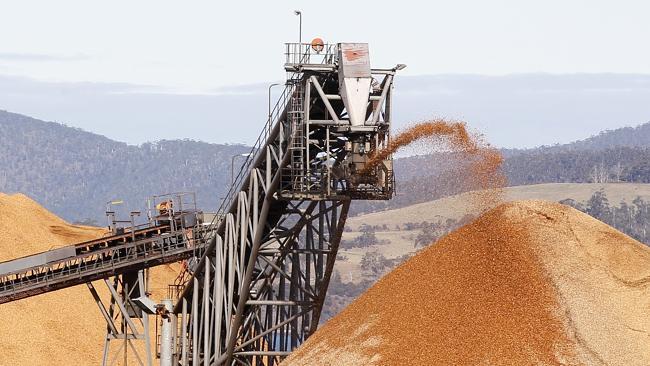New Forests buys Gunns plantations for $330m, eyes woodchip exports
THE buyer of tree plantations held by Gunns will focus on exporting it as woodchips, clouding the hopes of a pulp mill in Tasmania.

THE new owner of vast tree plantations previously held by failed timber company Gunns Ltd will focus on exporting the resource as woodchips and is sceptical about prospects for a pulp mill in Tasmania.
Receivers KordaMentha today announced Sydney-based timber investment fund New Forests had purchased almost 100,000 ha of Gunns’ plantations, two export woodchip mills and port access, as forecast by The Australian last week.
New Forests refuses to take on Gunns mill
New Forests, which purchased the assets in a competitive process, was not interested in buying Gunns’ permit to build and operate a pulp mill in the Tamar Valley, for which the plantations had been intended as feed-stock.
KordaMentha said it would continue to negotiate with several parties who had expressed an interest in the pulp mill permit and is expected to eventually find a buyer at some price.
However, any proponent of the $2.5 billion project would now need to secure a wood supply agreement with New Forests for all of the 100,000 ha, in addition to a further 100,000 ha held by a variety of other entities.
New Forests chief executive David Brand told The Australian his company – understood to have paid about $330m for the Gunns assets - would focus on chipping the plantation timber and exporting it to Japan, China and India.
Dr Brand was sceptical about the economics of the controversial pulp mill proposed by Gunns, which sank into liquidation in March last year after being placed into administration in September 2012.
“A lot of pulp and paper companies that are listed are trading at below their net asset value, so why would someone invest in new pulp mills?” Dr Brand said.
“People have been talking about someone investing in the (Gunns) pulp mill for 10 years, but it hasn’t become a reality and no one has approached us for a wood-supply agreement.”
However, with new pulp mills coming on line in Asia, and the growth of the demand in China and India, he expected a “very strong recovery” in Australian woodchips exports.
“There is an expectation that the overall market demand (for woodchips) will increase by about 25 per cent over the next two years,” he said.
“There is an increasing move for Vietnam to shift to domestic processing, rather than woodchip export, and … that would be significant opportunity for Australia to fill.”
He would not rule out considering any request for a wood supply agreement from a pulp mill proponent. However, he suggested veneer and engineered wood products were a more likely form of future down-stream processing in Tasmania.
Dr Brand confirmed New Forests remained interested in further acquisitions but would not comment on speculation it intended to purchase Forest Enterprises Australia.



